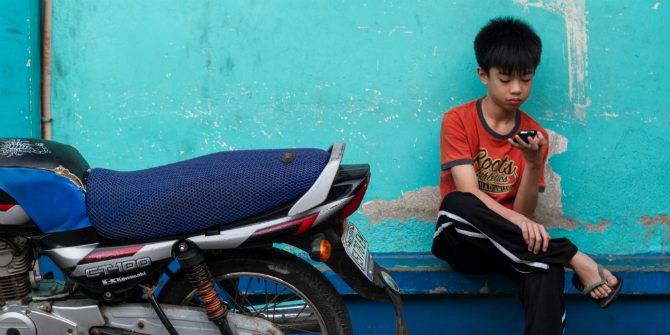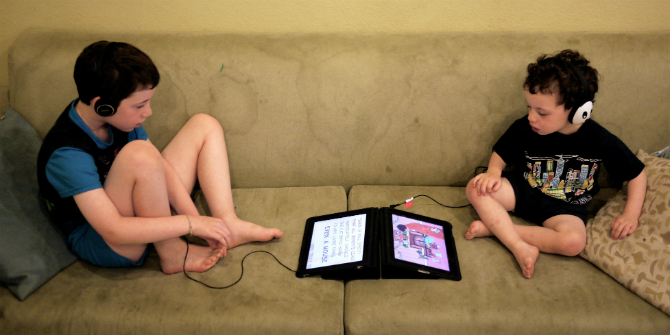Sun Sun Lim explores the effect of asymmetries in families created by the use of mobile devices in Asia. Sun has studied the social implications of technology domestication by young people and families in Asia for over 10 years. Her forthcoming book, Mobile communication and the family – Asian experiences in technology domestication, features chapters on Cambodia, China, India, Indonesia, Korea, the Philippines, Singapore and Vietnam. Sun is Assistant Dean for Research at the Faculty of Arts and Social Sciences and Associate Professor at the Department of Communications and New Media, National University of Singapore.
A low-waged Indian worker in Cambodia saves money to buy his wife back home a mobile phone, thus raising her status among her in-laws. A mother in Vietnam scans Facebook to check on her daughter, a university student in Singapore, much to the daughter’s chagrin. A toddler in Indonesia knows that if she wants easy access to a mobile device, she will have greater luck approaching her father than her mother.
What do all these families from diverse parts of Asia, avidly incorporating mobile communication into their daily lives, have in common? In a word – asymmetries. As powerful portable media devices such as mobile phones and tablets spread across the region at an unparalleled rate, families in Asia are coming to terms with the many asymmetries that these gadgets herald.
Power, expectation and practice asymmetries
The simple matter of who owns or pays for a mobile device can introduce power asymmetries in a family, enabling one member to impose conditions on another. Differing standards between parents and children as to how much the former can intrude into the online lives of the latter are borne out of expectation asymmetries. And the uneven manner in which fathers and mothers apply rules surrounding children’s mobile device use arise from practice asymmetries. On top of these asymmetries are those pertaining to access, competencies and values.
Mobile devices, with their myriad affordances for connecting, informing, entertaining and supporting us in our everyday routines, have become a mainstay in almost every Asian household. For my upcoming book, I had the privilege of bringing together research on families from rural and urban areas, across a spectrum of socioeconomic profiles. These families’ varied yet convergent experiences illuminate how mobile devices, while increasingly commonplace, are influencing family interactions in distinctive ways.
 Credit: Eve Yeo, published in the Social Media Resource Kit
Credit: Eve Yeo, published in the Social Media Resource Kit
Monitoring mobile communication
Where parents and children have differing expectations on whether, and how, parents should monitor their children via mobile communication, the trend seems to have become more intense and complex over time. Earlier in my career, when I studied Korean families in 2006, I interviewed a mother who shared:
“My younger son likes to use the computer a lot and in CyWorld you can write your diary and upload your photos and you can expose your daily life via the CyWorld homepage…. I viewed his diary secretly – he doesn’t know that I am looking as I usually access it from the office…. Sometimes I’m surprised by the different side of him. Essentially I wanted to check if he had a girlfriend, especially at this age where such problems are common … [but] my husband told me that I am invading his privacy so I don’t do it anymore.” (pharmacist, 50)
Consider this recent example from my current research¹ on migrant students, of a Vietnamese mother who kept close tabs on her university-aged daughter who was studying in Singapore. As the daughter lamented:
“Actually, there were a few times that I went out with my friends and came home late, and called my mother late. So my mother was irritated, like ‘Why do you hang out so late?’ At that time, I was not very happy either…. There was a day when she said, ‘when I did not see you do anything on Facebook, I was afraid you disappeared, or went somewhere or something.’” (undergraduate, 20)
From the mother’s perspective, her daughter’s public online posts were open to everyone, including her. But from her daughter’s standpoint, Facebook posts have a specific purpose for a particular audience, and were certainly not meant for parental oversight! With the proliferation of social media and location-based services, as well as the increasingly public nature of personal media updates, norms about the nature and extent of parental surveillance are most definitely shifting and constantly being contested.
Recognising and negotiating the asymmetries
Clearly, as mobile devices inveigle their way into the domestic space, meshing with but also disrupting family rhythms, their presence cannot be taken for granted. Indeed, families in Asia and beyond must learn to recognise and negotiate the asymmetries that these devices introduce, and how these may be affecting the bonds on which familial relationships are built.
NOTES
¹ Pham, B. and Lim, S.S. (2015: in press) ‘Empowering interactions, sustaining ties: Vietnamese migrant students’ communication with left-behind family and friends’, in S.S. Lim (ed) Mobile communication and the family – Asian experiences in technology domestication, Dordrecht: Springer.






